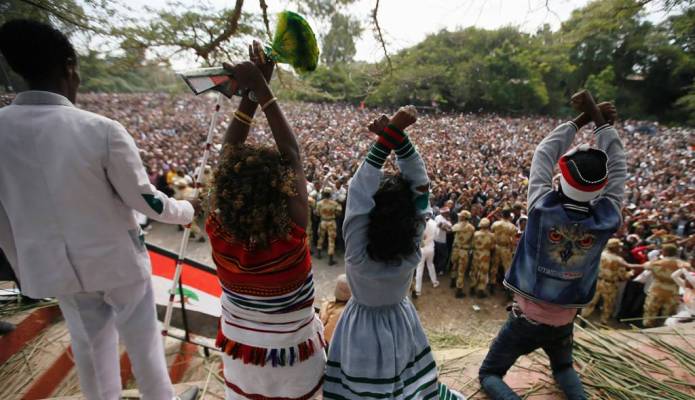U.S. issues travel warning to Ethiopia after deadly unrest

By Tesfa-Alem Tekle
October 22, 2016 (ADDIS ABABA) – The United States government has issued travel warnings to Ethiopia after waves of violent anti-government protests claimed lives of hundreds of people in Ethiopia’s Oromia and Amhara regions.
In a statement issued on Friday, the U.S. Department of State urged its citizens to defer all non-essential travel to Ethiopia.
Effective as of October 8, 2016, the Government of Ethiopia declared a six-months state of emergency in the face of unprecedented anti-government protests.
The government says the state of emergency was declared in order to restore order and safeguard the safety of civilians and to put an end to the damage that is being carried out against private and government infrastructure project.
The state of emergency, Ethiopia’s first in over quarter a century, includes shut down to internet access and ban on all social Medias which had been major tools to organize protests in Oromia and Amhara region.
A 15 October decree states that individuals may be arrested without a court order for activities they may otherwise consider routine, such as, attending unauthorized gatherings, engaging with certain foreign governments or banned political organizations, showing protest gestures and violating curfews.
The new directive also prohibits diplomats from traveling beyond 40 kilometers of the radius outside the capital, Addis Ababa.
A dusk-to-dawn curfew remains imposed around areas where factories and major infrastructure projects are based.
The U.S. embassy in Ethiopia said the imposed restrictions have severely affected its efforts to assist American citizens.
According to the U.S. embassy, government personnel are restricted from personal travel to many regions in Ethiopia, including Oromia, Amhara, Somali and Gambella states, southern Ethiopia near the Ethiopian/Kenyan border, and the area near the Ethiopia/Eritrea border.
It said its ability to provide consular services in many parts of the country is limited by the current security situation.
Internet, cellular data, and phone services have been periodically restricted or shut down throughout the country, impeding the Embassy’s ability to communicate with U.S. citizens across the country.
The U.S. embassy in Addis Ababa advised its citizens in Ethiopia to use other alternate communication means to let their family and friends know about their situation.
“Avoid demonstrations and large gatherings, continuously assess your surroundings, and evaluate your personal level of safety” the statement said.
“Remember that the government may use force and live fire in response to demonstrations, and that even gatherings intended to be peaceful can be met with a violent response or turn violent without warning ” it added.
Due to the unpredictability of communication in the country, the Department of State strongly advises U.S. citizens to register their mobile number with the Embassy to receive security information via text or SMS, in addition to enrolling in the Smart Traveler Enrollment Program (STEP).
The most recent protests erupted after at least 55 were killed in a stampede at religious festival in Oromia region when police fired tear gas to disperse group of protesters.
Ethiopian authorities have admitted that more than 1,600 people have so far detained under the state of emergency in the Oromia and Amhara regions.
The above figure does not include the over 1,000 people arrested around the capital.
Human Rights Watch said the latest protests have claimed lives of up to 500 protesters within the Oromia region.
The Oromos initially staged demonstrations in late 2015 in protest to government plans to expand the capital’s territory to parts of the Oromia region.
However, the Oromos are now demanding for wider political and economic rights or regime change.
(ST)
